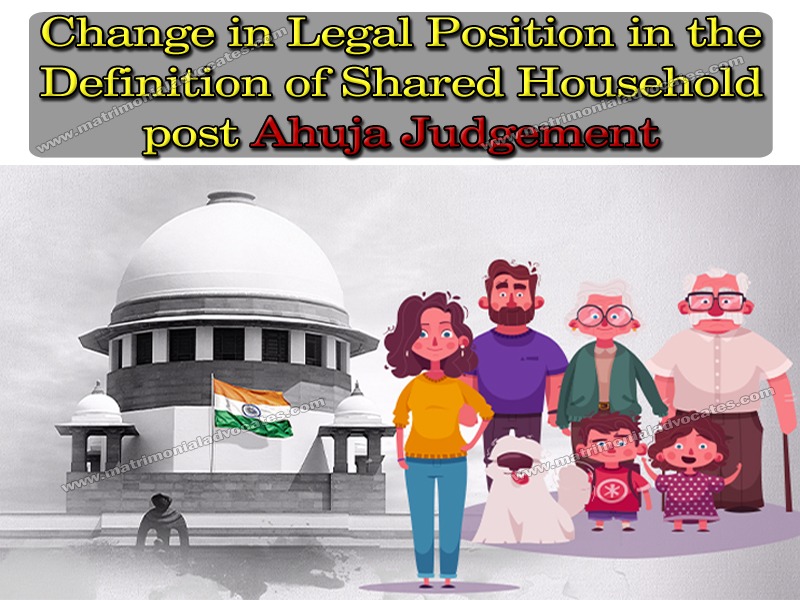
CASE COMMENTS: ON SATISH CHAND AHUJA VS. SNEHA AHUJA (Civil App. 2483/2020 SC)
Introduction:
Rosco Pound said1, “Law is social engineering which means a balance between the competing interests in society”. The Courts of law have often to do this social engineering in order to balance the variety of rights coming in conflict with one another in a complex society like in India. They can also not overlook the societal conditions and realities prevailing while adjudicating these rights by merely referring and relying to the black letters of law.
In a recent Landmark Judgement Titled “Satish Chand Ahuja Vs. Sneha Ahuja2” Supreme Court of India tried to weigh and balance the rights of two distinct and vulnerable groups i.e. Married Women and their right to reside in matrimonial home pitted against rights of Senior Citizens to oust their Son and Daughter in law from the house solely belonging to them.
This issue has gained importance in and around the development of law brought forth by the enactment of Protection of Women from Domestic Violence Act 20053 (referred as DV, Act) which made an exception to the general law and provided among other reliefs to the aggrieved woman, the right to reside in matrimonial home irrespective of her own right or interest in the property.
It has been more than 15 years since the DV Act was passed in Parliament, however one would not find expected development of the much-detailed observations of the Higher Courts on this very enactment of Law. One of the probable reasons for this may be the fact that most of the litigation that stems out of matrimonial discord end up in settlements and the cases do not reach to the High Court or Supreme Court.
The present Judgment can be considered as a landmark case, not because it has bought the attention of the Supreme Court which ultimately gave details guidelines on the issues involved,
1 Roscoe Pound, available at https://www.google.com/search?q=rosco+pound&oq=rosco+pound&aqs=chrome..69i57l2j0i271l2.3060j0j7&s ourceid=chrome&ie=UTF-8 ( Last Visited March, 2021)
2 Civil Appeal no. 2483/2020 SC.
3 Protection of Women from Domestic Violence Act, 2005 (Act
but at the same the time the it has also attempted to balance the rights of the two class of the society i.e. Women and Senior Citizens.
The trend set in the in Indian Society (Specially in Metro Cities) after the S.R. Batra & Anr. Vs. Smt. Taruna Batra4 Judgement, has potentially damaged structure of reliefs an aggrieved woman can get under the DV act more particularly her right to residence in a shared House hold. After this Judgement, the parents in law started disowning their son’s from their self- acquired properties in order to curtail the right of Daughter in law to get residence order in her favour.
The analysis of the judgement under discussion would show that it does not lean towards any specific section of the society when it come of rights of Women to reside in the Shared House or the right of the aged parents to oust the daughter in law or son from their own property in order to have a peaceful life. It also further clarified on the conflicting jurisdictions of Civil Court and Criminal Court.
Legal Issues Involved:
The apex Court had an occasion to deal and answer the several legal issues involved in that case, however the issue of conflicting rights of Daughter-in-law and that of Parents in law with respect to the matrimonial home is the matter of discussion herein.
The Supreme Court among other, framed a point for determination as to whether the interpretation & definition of shared household as provided under section 2(s) of the Protection of women From Domestic Violence Act, 2005 has to be read to mean that a “Shared Household” for the purpose of the above stated definition would only be the one which is either Joint Property or the one in which the Husband of the aggrieved has a share and on that lines whether Supreme Court had correctly interpreted the definition of Shared Household in S.R. Batra Vs. Taruna Batra5.
Facts of the Case:
Before the Case reaching to Supreme Court, the issue stemmed from the matrimonial conflict between husband and wife. The Husband Raveen Ahuja was married to Sneha Ahuja and they both started residing at the house belonging to the father of Raveen Ahuja namely Satish Chand Ahuja. After the matrimonial differences arose between Husband and wife, Raveen Ahuja filed
4 Civil App. No. 5837/2006 SC
5 Ibid.
a Divorce petition against Sneha Ahuja and Sneha Ahuja filed a complaint under section 12 of DV Act impleading Satish Chand Ahuja and his wife (Father and Mother-in-law respectively).
The Magistrate upon the Domestic Violence complaint of Sneha Ahuja passed an interim order restraining Satish Chand Ahuja not to alienate the property or oust Sneha Ahuja from the House, Considering the same as Matrimonial Home.
Subsequently Satish Chand Ahuja filed an Injunction suit for eviction of Sneha Ahuja from his property claiming it to be his own self acquired property in which neither his Son Raveen Ahuja or daughter in law Sneha Ahuja has got any rights.
Decision of trial Court in Civil Suit:
The Trial Court hearing injunction suit filed by Satish Chand Ahuja, decreed the suit under order XII Rule VI in his favour relying upon certain admission made by Sneha Ahuja.
High Court Verdict:
As Sneha Ahuja Challenged the order of the Civil Court before Delhi High Court, the high Court disposed off the appeal by a common order and remanded the matter back to the trial court for re-adjudication. While sending the case back the High Court make several observation/guidelines and observed that:
- Issue for adjudication was not related to determination as to whether the property in question was a shared household or not because the proceeding under DV Act were already going on.
- Having regard to the above observation, however it cannot be said that suit for injunction was not maintainable as issue for determination squarely covered under section 17 (2).
- Trial Court committed an error in not impleading the Husband i.e. Raveen Ahuja by its own suo moto power under order I rule X and further mandated that in all such cases husband to be impleaded as necessary party.
- Further, the High Court make distinct directions in respect of two different situations or facts i.e.
- When wife admits that the property belongs to her in laws/relatives and her entire claim stems from right to residence as provided under DV Act. In Such cases the trial Court before passing a decree of eviction shall ensure that the aggrieved/defendant is provided with an alternate accommodation.
- When aggrieved person dispute the exclusive ownership of property, trial court shall grant an opportunity to defendant to lead evidence in this regard. Here trial Court may pass an interim order directing the aggrieved person to vacate the property subject to the alternate accommodation as provided under section 19(1) of DV.
Supreme Court Judgement:
Historical Background & Scheme of the DV, Act 2005
Hearing of the appeal filed against the Judgement of Delhi High Court, the Supreme Court trace the History of right available to the women prior to the enactment of DV act and how those general legislations were inadequate to deal with the situation in wholesome manner. The provisions such as Section 498A IPC, Section 13 of Hindu Marriage Act (to seek divorce) etc. was not relief centric where the aggrieved woman can redress her grievances.
In so far as right to residence in a matrimonial home, the Supreme court quoted J. Sabyasachi Mukherji wordings in B.R. Mehta Vs. Atma Ram and Ors6. where the Court observed that there is no right to occupation in matrimonial home in India unlike in England where under Matrimonial homes Act, 1967 (repealed by matrimonial Homes Act, 1983) such rights have been provided. Sabyasachi Mukherji, J. anticipated and stress upon the need of such rights be provided in India. This need was ultimately fulfilled by the enactment of DV, Act 2005 which among other reliefs created an entitlement for women to reside in her matrimonial home irrespective of her legal rights or interest in it.
On Definition of Shared Household
As the definition of shared household provided under section 2(s) of DV Act, 2005 begins as “shared household means where the person aggrieved lives or at any stage has lived in a domestic relationship either singly or along with the respondent and includes.”. Interpreting the words “means & includes” supreme court held it to be an exhaustive definition and covers only those falling under the purview of the said definition.
On S.R. batra Vs. Taruna Batra7
6 (1987 4SCC 183)
7 Ibid
As this Case was heavily relied upon by the Appellant Satish Chand Ahuja before Supreme Court while buttressing his arguments that house where wife was residing cannot be said to be a shared household and a daughter in law has no right to reside in a property solely belonging to either father-in-law or mother-in-law unless it is a joint family property or having right, share or interest of her Husband. Supreme Court dealt with this case in details and expressed its disagreement with the reasoning given and how the Court interpreted the definition of shared Household.
Court ultimately overruled this Judgement and held that shared household as contemplated in DV Act, 2005 is the one where the aggrieved person was living at a time when application under DV Act, 2005 was filed or in recent time she has been excluded from the use or she is temporary absent and mere casual living at different place would not make the abode a shared household within the meaning given under DV Act, 2005.
On second issue as to whether an aggrieved person has a right to residence in a property not belonging to or taken on rent by her Husband or where the property is not a joint family property the Court noted that by a conjoint reading of the definition of shared household and respondent it is clear that there is no requirement that the shared household would only the one where the husband of the aggrieved person has got some right or interest.
Who has the responsibility wife/aggrieved person: Husband or Parents in law:
It is a settled law that the responsibility to maintain the wife is on Husband and during the subsistence or lifetime of the Husband, this responsibility cannot be casted upon anyone including father in law or mother in law unless a joint property could be traced in their possession in which her husband has got right and only in cases where the such maintenance could not be enforced through husband and this is what has been held in Vimlaben Ajitbhai Patel Vs. Vatsalben Ashokbhai Patel and Ors8., however the supreme court did not agree with the ratio of this judgement as it has already overruled the S.R. Batra Case which was relied upon in this case as well.
Further in Navneet Arora vs. Surender Kaur and Ors9., (which the supreme court mentioned in this judgement) held in para 58 of the judgement that:
8 (2008) 4 SCC 649
9 2014 SCC Online Del 7617
“58. It may be highlighted that the Act does not confer any title or proprietary rights in favour of the aggrieved person as misunderstood by most, but merely secures a right of residence in the shared household. Section 17(2) clarifies that the aggrieved person may be evicted from the shared household but only in accordance with the procedure established by law. The legislature has taken care to calibrate and balance the interests of the family members of the respondent and mitigated the rigour by expressly providing under the proviso to Section 19(1) that whilst adjudicating an application preferred by the aggrieved person it would not be open to the Court to pass directions for removing a female member of the respondent’s family from the shared household. Furthermore, in terms of Section 19(1)(f), the Court may direct the respondent to secure same level of accommodation for the aggrieved person as enjoyed by her in the shared household or to pay rent for the same, if the circumstances so require10.”
The Court also considered the social aspect and how the family reside in India where most of the married couple live in the parental house of the husband and these ebodes mainly belongs father or mother of the husband. Thus the Court considering this distinct living and family structure tried to give a wider definition of the term shared household.
In an another case Vinay Verma vs. Kanika Pasricha & Anr11. CM(M) Delhi high court laid down some broad guidelines with respect to the responsibility of alternate accommodation to be provided to wife and upon whom that responsibility can be casted (Husband or In-laws). The Court in one of the guidelines in that case stressed upon need of ascertaining whether the daughter in law was living as a part of joint family. However, it is noteworthy herein that the Supreme Court agreed to the guidelines as laid down by Delhi High Court in this Case, which itself relied on Vinay Verma Case (supra) so far, the issue of responsibility of providing alternate accommodation. But the Court did not appreciate the fact that in Vinay Verma Case, Court noted that there is a need of ascertaining the factum of whether the wife was living as a part of joint family and only in case of collusion between parents and son to oust the daughter in law/wife from matrimonial home, the responsibility to provide alternate accommodation would remain on both.
The Court has left an important aspect untouched that it is the husband who has to bear the responsibility of wife and issue of providing an alternate accommodation should first be dealt casting responsibility upon the husband. When parents in law seek eviction of both, son-in-law
10 Ibid.
11 CM(M) 1582/2018 DHC.
and daughter-in-law and the same is resisted by daughter in law claiming right to residence in shared Household, the Courts first endeavour to secure her accommodation through her Husband who has got the responsibly to maintain her and only in those case where it is at least prima-facie proved that there is exist a collusion between in-laws and Husband of the aggrieved person, Courts should not be in hurry to order eviction in civil proceedings.
Issue of Conflicting jurisdictions of Civil Court and Criminal Courts w.r.t to the right of wife to live in a shared household and right of the property owner to get eviction.
Referring to the paragraph 56 of the Delhi high Court Judgment and validating the directions as given thereunder Supreme Court made it clear that no right has prominence over other and court while granting reliefs either under DV Act, 2005 or other civil proceedings has to have due regard to the rights of Senior Citizen to have a peaceful life. Delhi high Court in the given para observed that if only defence of the wife is the one under DV, Act 2005 of right to residence, the Court shall ensure the wife is provided an alternate accommodation at the time of direction to vacate the suit premises. It would be worth mentioning that the directions given by Delhi High Court as against whom this alternate accommodation order is to be passed for execution is not clear. In a situation where such alternate accommodation could not be secured through Husband, then would it be the duty of the parents to do so. This has not been answered herein.
Bearing of the decision of civil court upon Criminal Court and vice versa.
Section 17 of the DV Act, 2005 talks about the right of the aggrieved woman to reside in a shared household irrespective or her any right, title or interest. It say that; “Right to reside in a shared household- (1) Notwithstanding anything contained in any other law for the time being in force, every woman in a domestic relationship shall have the right to reside in the shared household, whether or not she has any right, title or beneficial interest in the same. (2) The aggrieved person shall not be evicted or excluded from the shared household or any part of it by the respondent save in accordance with the procedure established by law”
The section itself allows the eviction of aggrieved person in accordance with the procedure established by law.
The Supreme Court of India it clear that different proceedings that may emanate from matrimonial discord between the parties such as one under DV, Act, 2005, or before Civil Court
are independent of each other, however the findings of one court has to be given due consideration by another.
The Court held that the orders passed in Criminal Court (in DV proceedings) are relevant within the meaning of the section 43 of the Indian Evidence Act and can be referred and relied by Civil Court, however any interim or final order as passed by criminal court regarding right to residence, would not be an embargo upon civil Court to proceed with the case and adjudicate and decide the issue of eviction. Before this clarification by the supreme court the position seemed to be uncertain lower courts were reluctant to entertain or pass an order in Civil Suit for injunction/eviction when they are apprised of the pending Domestic violence proceeding against the plaintiff.
Conclusion
By this Judgement, the Supreme Court of India has provided some certainty of procedure and adjudication to the legal questions involved in such Cases, which are definitely going to help the lower courts to take up the matters with clarity. But at the same time, the wider definition as given by the Supreme of India to the meaning of Shared Household including therein the house(s) even of the relatives may be a problematic and prone to abuse considering to the gross violations of women centric Law.





